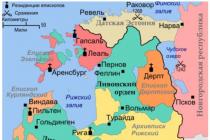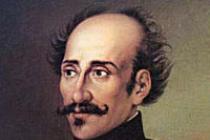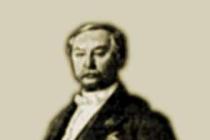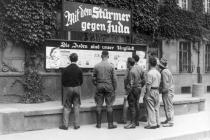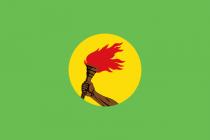The emergence of the national liberation movement.
At the end of the 18th - beginning of the 19th centuries. The long and persistent struggle of the Greek people for national liberation acquired a wide scope and a qualitatively new content. By this time, significant changes had occurred in the Greek economy and its social life associated with the formation of the capitalist structure in Western and Central Europe. Large areas of Greece began to be drawn into sphere commodity-money relations. A significant part of the grain, tobacco, and cotton produced in the country went to European markets. The economic role of the city of Thessaloniki has increased, becoming the largest port not only in Greece, but also in the entire Balkan region. The expansion of pawn trade created the prerequisites for the development of local trading capital: in the first years of the 19th century. There were 50 Greek trading firms in the Peloponnese. But the social order in Greece prevented any significant development of the bourgeoisie. As F. Engels noted, “...Turkish, like any other eastern domination, is incompatible with capitalist society; acquired surplus value is not guaranteed in any way from the rapacious hands of satraps and pashas; the first basic condition of bourgeois entrepreneurial activity is missing - the security of the merchant’s personality and his property."
Under the disastrous conditions of Ottoman rule, only the trading bourgeoisie of the Aegean archipelago was able to turn into a serious economic and political force. In 1813, the Greek merchant fleet consisted of 615 large ships. Most of them sailed under the Russian flag. Thus, using the policy of “patronage” pursued by the tsarist government for the Orthodox population of the Balkans, Greek merchants received significant guarantees of preserving their property 2 .
Changes also occurred in the spiritual life of Greek society. The last decades of the 1111th century and the first decades of the 19th century. entered the history of Greek culture as the Age of Enlightenment. This was a period of rapid growth in spiritual life. New educational institutions were founded everywhere, and book printing in Modern Greek expanded significantly. Great scientists, original thinkers, and wonderful teachers appeared. Their activities, as a rule, took place outside the borders of Greece - in Russia, Austria, France, where many Greek immigrants settled.
Foreign communities became the base of the Greek national liberation movement that arose at the end of the 11th century. under the direct influence of the French bourgeois revolution. To fight for the liberation of Greece, the idea of revolution was first used by the fiery revolutionary and poet Rigas Velestinlis. He developed a political program that provided for the overthrow of the Ottoman yoke by the united efforts of the Balkan peoples. But Velestinlis’s liberation plan became known to the Austrian police. The Greek revolutionary was arrested and handed over to the Porte along with seven of his associates. On June 24, 1798, the brave freedom fighters were executed in the Belgrade Fortress.
Despite this heavy blow, the movement for the liberation of Greece continued to gain strength. In 1814, Greek settlers founded the secret national liberation society “Filiki Eteria” (“Friendly Society”) in Odessa. Within a few years, the organization had gained numerous adherents in Greece and Greek colonies abroad. The founding of “Filiki Eteria” in Russia greatly contributed to the success of its activities. Although the tsarist government did not encourage the liberation plans of the Eterists, the widest circles of Russian society were sympathetic to the struggle of the Greeks for their liberation. In the minds of the Greek people, from the first centuries of Ottoman rule, there lived the hope that it was Russia, a country of the same faith as the Greeks, that would help them free themselves. These expectations received new food when in April 1820 Filiki Eteria was headed by the prominent Greek patriot Alexander Ypsilanti, who served in the Russian army with the rank of major general. Under his leadership, the Eterists began preparing an armed uprising.
The beginning of the revolution.
The banner of the national liberation struggle was raised in the Danube principalities, where Filiki Eteria had many supporters. Arriving in Iasi, A. Ypsilanti published an appeal on March 8, 1821, calling for an uprising, beginning with the words: “The hour has struck, brave Greeks!” A. Ypsilanti's short campaign in Moldova and Wallachia ended unsuccessfully. But it diverted the attention and forces of the Porte from the uprising that broke out in Greece itself.
The first shots rang out in the Peloponnese at the end of March 1821; Soon the uprising spread throughout the country (Independence Day is celebrated in Greece on March 25). The Greek national liberation revolution lasted eight and a half years. The following main stages can be distinguished in its history:
1821 – 1822 Liberation of a significant part of the country's territory and the formation of the political structure of independent Greece;
1823 – 1825 Aggravation of the internal political situation. Civil wars;
1825 – 1827 Fight against the Turkish-Egyptian invasion;
1827 – 1829 Beginning of the reign of I. Kapodistrias, Russian-Turkish war
1828 – 1829 and the successful completion of the struggle for independence.
The main driving force of the revolution was the peasantry. During the struggle, it sought not only to get rid of the foreign yoke, but also to obtain land confiscated from the Turkish feudal lords. Large landowners and rich people who took over the leadership of the uprising shipowners sought to preserve and strengthen their property interests and political privileges. The serious successes of the uprising in 1821 made it possible to convene the National Assembly, which on January 13, 1822 proclaimed the independence of Greece and approved a provisional constitution - the Organic Statute of Epidaurus. It was greatly influenced by the constitutions of bourgeois France at the end of the 15th century. A republican system was established in Greece and a number of bourgeois-democratic freedoms were proclaimed. The government structure was based on the principle of separation of powers. The executive branch of five people received the greatest rights. A. Mavrokordatos, who defended the interests of the wealthy elite of Greek society, was elected president of the executive branch.
Sultan Mahmud II did not accept the fall of Greece. Barbaric repressions fell upon the rebellious population. The bloody massacre took place in the spring of 1822 on the island of Chios. 23 thousand civilians were killed, 47 thousand were sold into slavery. The flowering island, which was called the garden of the Archipelago, was turned into a desert.
But the Christian monarchs of Europe also greeted the revolution in Greece with open hostility. The leaders of the Holy Alliance, who gathered at their congress in Verona in 1822, refused to deal with representatives of the Greek government as rebels against their “legitimate sovereign.” In difficult conditions of foreign policy isolation, the rebels successfully continued their unequal struggle. The selected 30,000-strong Turkish army, which invaded the Peloponnese in the summer of 1822, was defeated by Greek troops under the command of the talented commander Theodoros Kolokotronis. At the same time, bold attacks by Greek ships forced the Turkish fleet to leave the Aegean Sea and take refuge in the Dardanelles.
The temporary weakening of the external threat contributed to the aggravation of social and political contradictions in the rebel camp, which led in 1823 - 1825. to two civil wars, the scene of which was the Peloponnese. As a result of these wars, the position of the Aegean shipowners strengthened, ousting the land nobility of the Peloponnese.
Turkish-Egyptian invasion.
Meanwhile, a new and formidable danger was approaching liberated Greece. Mahmud II, with the promise of concessions to the Peloponnese and Crete, managed to draw his powerful vassal, the ruler of Egypt, Muhammad Ali, into the war. In February 1825, an Egyptian army landed in the south of the Peloponnese, commanded by the son of Muhammad Ali, Ibrahim Pasha. It consisted of regular units trained by French instructors. The Greek forces, despite the heroism shown in the battles, were unable to stop the advance of the Egyptians.
Having again subjugated most of the Peloponnese, Ibrahim Pasha in December 1825, with an army of 17,000, approached Mesolonga, an important rebel stronghold in Western Greece. The entire population fought on the towers and bastions of the city, which bore the names of William Tell, Skanderbeg, Benjamin Franklin, Rigas Velestinlis and other freedom fighters. The 20,000-strong Turkish army, which had been standing under the walls of the city since April 1825, was unable to capture it. But the arrival of the Egyptian army and fleet created a huge preponderance of forces in favor of the besiegers. Mesolonghi's connection with the outside world was severed. As a result of continuous bombing, most of the houses were destroyed. A terrible famine was raging in the city. Having exhausted all possibilities of resistance, the defenders of Mesolonghi made an attempt to break through the enemy lines on the night of April 22-23, 1826. Almost all of them died in battle and during the massacre committed by the Turkish-Egyptian troops who burst into the city.
After the fall of Mesolonghi, fierce fighting continued on all fronts. In June 1827, the Greeks suffered a new serious setback - the Athenian Acropolis fell. As a result, all Greek regions north of the Isthmus of Corinth were again occupied by the enemy. But even during this difficult period, the determination of the Greek people to achieve liberation did not weaken. In March 1827, the National Assembly in Trizin adopted a new constitution. In it, the bourgeois-democratic principles of the Epidaurus Constitution were further developed. Here, for the first time, the principles of sovereignty of the people, equality of citizens before the law, freedom of the press and speech were proclaimed. But in the new constitution, as in the previous ones, the agrarian question was not resolved. The Trizin Constitution introduced the position of the sole head of state - the president. He elected an experienced statesman and diplomat, former Russian Foreign Minister Ioannis Kapodistrias, for a seven-year term. Arriving in Greece in January 1828, the president took energetic measures to improve the economic situation of the country, increase the combat capability of the armed forces, and centralize control. By this time, a favorable turn in the international situation had taken place for the Greeks.
The Greek question in the international arena.
The struggle of the Greek people for freedom received great international resonance. A broad public movement of solidarity with the rebel Greeks swept many countries in Europe and the United States. Philhellenic committees were active in Paris, London, and Geneva, raising funds for fighting Greece. Thousands of volunteers from different countries rushed to help the Greeks. Among them was the great English poet Byron, who died for the cause of Greek freedom. The Greek revolution aroused great sympathy in all layers of Russian society. She was greeted with particular enthusiasm by the Decembrists and circles close to them. These sentiments were expressed by A. S. Pushkin, who wrote in his diary in 1821: “I am firmly convinced that Greece will triumph and 25,000,000 Turks will leave the flourishing country of Hellas to the legitimate heirs of Homer and Themistocles.”
In Russia, subscriptions were successfully completed in favor of the large number of refugees from the Ottoman Empire who had found refuge in Novorossiya and Bessarabia. The funds were also used to ransom the inhabitants of Chios who had fallen into captivity. The irreversible changes in the Balkans caused by the Greek Revolution intensified the rivalry between the great powers, primarily between England and Russia, and forced them to reconsider their policies towards Greece. In 1823, the British government recognized Greece as a belligerent.
In 1824 – 1825 Greece received British loans, which marked the beginning of the financial enslavement of the country by foreign capital. In 1824, Russia put forward its plan for resolving the Greek question based on the creation of three autonomous Greek principalities. Soon there was a tendency towards agreement between the rival powers.
On July 6, 1827, England and Russia, joined by France, concluded an agreement in London. It provided for the cooperation of these powers in ending the Greco-Turkish War on the basis of granting Greece full internal autonomy. Ignoring this agreement by the Porte led to the Battle of Navarino (October 20, 1827), in which the squadrons of Russia, England and France that arrived on the shores of Greece defeated the Turkish-Egyptian fleet. The Battle of Navarino, for which the Sultan blamed Russia, strained Russian-Turkish relations. In April 1828, the Russian-Turkish war began. Having won it, Russia forced Mahmud II to recognize the Peace of Adrianople agreement 1829 Greek autonomy. In 1830, the Porte was forced to agree to grant the Greek state independence status.
Results and significance of the revolution.
The creation of an independent state was of great importance for the Greek people, for their national and social progress. Greek national liberation revolution 1821 – 1829 It also became an important milestone in the struggle of European peoples for national liberation, against tyranny and despotism. This was the first successful revolutionary action in Europe during the Restoration period and at the same time the first major defeat of European reaction. The Greek revolution was especially important for the Balkans. For the first time, a Balkan country achieved independence. This became an inspiring example for the peoples of other Balkan countries.
But the Greek revolution failed to resolve a number of major social and political problems. The Greek peasantry remained landless, bearing the entire burden of the struggle on their shoulders. The lands confiscated from the Turkish feudal lords, which accounted for more than a third of the cultivated area, became the property of the state. These “national lands” were cultivated by landless peasants under enslaving conditions. The problem of national liberation was only partially resolved. The new state included the territory of continental Greece, limited in the north by a line between the bays of Arta and Volos, and the Cyclades islands. Thessaly, Rapier, Crete and other Greek lands remained under the Ottoman yoke.
The powers participating in the Treaty of London of 1827 unceremoniously interfered in the internal affairs of Greece and incited political strife. Their victim was I. Kapodistrias, who was killed on October 9, 1831 in the then capital of the Greek state of Nauplia. The “patron powers” imposed a monarchical system on Greece. In 1832, Russia, England and France proclaimed Prince Otto from the Bavarian Wittelsbach dynasty king of Greece.
Russian empire
France
Great Britain
Egypt
Greek War of Independence, sometimes also called Greek revolution(Greek Ελληνική Επανάσταση του 1821) - the armed struggle of the Greek people for independence from the Ottoman Empire, which began in the city and ended in the city with the Treaty of Constantinople, which established Greece as an independent state. The Greeks were the first of the subject peoples of the Ottoman Empire to gain independence. It is with these events that the history of modern Greece begins.
Background
The Ottoman Empire ruled almost all of Greece, with the exception of the Ionian Islands, during the 14th and 15th centuries. But in the 18th and 19th centuries, a wave of revolutions swept across Europe. The power of Turkey was decreasing, Greek nationalism began to assert itself and increasingly gained support from Western European countries.
In 1814, Greek patriots N. Skoufas, E. Xanthos and A. Tsakalov formed a secret organization “Φιλική Εταιρεία” (“Friendly Society”) in Odessa. In 1818, the center of the organization was moved to Constantinople. With the support of wealthy Greek communities located in Britain and the United States, with the help of sympathizers in Western Europe and secret help from Russia, they planned an uprising against Turkey.
The revolt against Ottoman rule was launched by a group of conspirators led by Ypsilanti, which consisted largely of Russian officers of Greek origin. John Kapodistrias was offered to lead the liberation movement, but he, holding important diplomatic posts in the Russian administration, for a long time considered it impossible for himself to participate in an uprising that was not officially supported by Russia.
Ypsilanti Rising

Alexander Konstantinovich Ypsilanti
The uprising began on March 6, 1821, when Alexander Ypsilanti, accompanied by several other Greek officials of the Russian army, crossed the Prut River in Romania and entered the territory of modern Moldavia with his small detachment. He was soon defeated by the Turkish army.
The uprising broke out in the Southern Peloponnese (Morea) on March 25 ( See article Herman (Metropolitan of Old Patras)). Within 3 months, the uprising covered the entire Peloponnese, part of mainland Greece, the island of Crete, Cyprus and some other islands of the Aegean Sea. The rebels captured significant territory. On January 22, 1822, the 1st National Assembly in Piado (near Epidaurus) proclaimed the independence of Greece and adopted a democratic constitution. Military operations against Turkish troops were relatively successful. Turkey's response was terrible, thousands of Greeks were repressed by Turkish soldiers, and Patriarch Gregory V of Constantinople was hanged. However, the Greeks did not remain in debt. Greek rebels executed thousands of Muslims, many of whom had nothing to do with Turkey or the revolution. All these events were poorly received by Western Europe. The British and French governments suspected that the revolt was a Russian plot to take over Greece and even perhaps Constantinople. However, the rebel leaders clashed with each other and were unable to establish regular administration of the liberated territories. All this led to internecine struggle. A civil war began in Greece (late 1823 - May 1824 and 1824-1825).
Intervention by international forces
In the city, the Turkish Sultan turned for help to the vassal, but who showed great independence, Khedive of Egypt Muhammad Ali, who had just carried out serious reforms of the Egyptian army according to European models. The Sultan of Turkey promised to make concessions regarding Syria if Ali helped. Egyptian forces, under the command of Ali's son Ibrahim, quickly took possession of the Aegean Sea. Ibrahim also enjoyed success in the Peloponnese, where he managed to return Tripolis, the administrative center of the region.
However, in European countries, especially in England and France (and, of course, in Russia), sympathy for the Greek patriots grew among the educated elite and the desire to further weaken the Ottoman Empire among politicians. In 1827, a convention supporting Greek independence was adopted in London. On October 20, 1827, British, French and Russian squadrons, under the overall command of the English Vice Admiral E. Codrington, entered Greek waters. On the same day, the allies met with the Turkish-Egyptian fleet in the Navarino Bay of the Peloponnese. During the four-hour battle of Navarino, the Turkish-Egyptian fleet was defeated by the allies. Following this, the French landing force landed on land and helped the Greeks complete the defeat of the Turks. Having won this victory, the allies did not take further joint actions aimed at undermining Turkey's military power. Moreover, disagreements began in the camp of the former allies over the division of the former possessions of the Ottoman Empire. Taking advantage of this, Türkiye declared war on Russia in December 1827. The Russian-Turkish War of 1828-1829 began. , in which Türkiye was defeated. According to the Treaty of Adrianople of 1829, Türkiye recognized the autonomy of Greece.
Independent Greece
On February 3, 1830, the London Protocol was adopted in London, which officially recognized the independence of Greece. By mid-1832, the borders of the new European state were finally drawn.
Statistics of the Greek Revolution
| Warring countries | Population (1821) | Soldier mobilized | Soldier killed | Civilians killed | |
|---|---|---|---|---|---|
| England | 14 100 000 | 8 000 | 10 | ||
| France | 31 150 000 | 10 000 | 100 | ||
| Russia | 49 300 000 | 1 200 000 | 10 000 | ||
| Greece | 950 000 | 100 000 | 50 000 | ||
| TOTAL ALLIES | 95 500 000 | 1 318 00 | 60 110 | ||
| Ottoman Empire | 26 500 000 | 400 000 | 15 000 | ||
| Egypt | 4 400 000 | 12 000 | 5 000 | ||
| TOTAL | 30 900 000 | 412 000 | 20 000 | ||
| TOTAL | 126 400 000 | 1 730 000 | 80 110 | 105 000 |
Literature
- Mernikov A. G., Spektor A. A. World history of wars. - Minsk, 2005.
Greek revolutionaries (1821)
Supported by:
|
Political: Military:
|
|
Celebrates its Independence Day on March 25 every year.
Background
Greece, transformed into a Turkish province in the 15th century, constantly strived for independence. From the turn of the 14th and 15th centuries, it ruled almost all of Greece, with the exception of the Ionian Islands, Crete and certain areas of the Peloponnese. In the 17th century, the Ottomans conquered the entire Peloponnese and Crete. But in the 18th and 19th centuries, a wave of revolutions swept across Europe. The power of Turkey was weakening, and a national upsurge began in Greece, which met with the support of Western European countries. Already in the 17th century, the Greeks looked to Russia, their fellow believer, as a support in their future struggle with the Turks; these hopes met with sympathy in the Russian ruling spheres. When the Russian squadron appeared in the Mediterranean in 1770, an uprising swept across the Morea, but it was easily suppressed by the Turks.
The wars between Russia and the Ottoman Empire at the end of the 18th century had no practical significance for the Greeks. The French Revolution gave a significant impetus to the liberation movement; The Greek poet of the late 18th century Rigas wrote freedom-loving, warlike songs. Rigas was handed over to the Turks by the Austrian authorities and, by order of the Belgrade Pasha, was executed in 1798. The poet's martyrdom enhanced the meaning and influence of his songs. Throughout Greece and wherever the Greeks lived, secret societies, heteria (friendships), began to form, with the goal of liberating Greece from Turkish rule.
In 1814, Greek patriots Nikolaos Skoufas, Emmanuel Xanthos and Athanasios Tsakalof created the secret organization Filiki Eteria (Greek. Φιλική Εταιρεία - Friendly society). In 1818, the center of the organization was moved to Constantinople. With the support of the wealthy Greek communities in Britain and the United States, with the help of sympathizers in Western Europe and secret help from Russia, they planned an uprising.
The revolt against Ottoman rule was launched by a group of conspirators led by Alexander Ypsilanti, consisting largely of Russian officers of Greek origin. John Kapodistrias was offered to lead the liberation movement, but he, holding important diplomatic posts in the Russian administration, for a long time considered it impossible for himself to participate in an uprising that was not officially supported by Russia.
Ypsilanti Rising
When a new ruler was appointed in Wallachia in 1821, there was a riot there; the Arnauts sent by Turkey to pacify joined the rebels; at the same time, Ali Pasha of Yaninsky refused to obey the Turkish Sultan.
This moment was considered convenient for starting the uprising. The Russian general, an ethnic Greek, Prince Alexander Ypsilanti, leaving his service without permission, arrived in Moldova and in March called on the Greeks to overthrow the yoke. Up to 6 thousand insurgents gathered to see him.
Giannakis Kolokotronis with a hundred fighters made his way to the Danube, crossed it and fought through Bulgaria and Northern Greece to the Peloponnese Peninsula, arriving in time to help his relative Theodoros Kolokotronis, who was besieging the Turks in Tripolis (Siege of Tripolitsa).
The defeats inflicted by the Turks on the heteriots at Dragomani and the monastery of Sekku, the official announcement by Russia that it had nothing to do with the movement of the revolutionary heteriots, put an end to the movement of the Greeks. In Constantinople, the Patriarch of Constantinople Gregory V, who was suspected of having relations with heterias, was hanged at the gates of his home in full bishop's vestments, and three metropolitans were executed with him. However, this spread the flames of the uprising throughout Greece and greatly inflamed Russia against Turkey, which broke off diplomatic relations with it.
All these events were poorly received by Western Europe. The British and French governments suspected that the revolt was a Russian plot to take over Greece and even perhaps Constantinople. However, the rebel leaders clashed with each other and were unable to establish regular administration of the liberated territories. All this led to internecine struggle. A civil war began in Greece (late 1823 - May 1824 and 1824-1825).
Revolt in Greece itself
Events of 1821
The uprising broke out in the southern Peloponnese (Morea), in the city of Areopolis on March 25 (April 6), 1821. Within 3 months, the uprising covered the entire Peloponnese, part of mainland Greece, the island of Crete, Cyprus and some other islands of the Aegean Sea. The rebels captured significant territory. The Turks hid in fortresses, and the few Turkish garrisons of Attica took refuge in Athens in the Acropolis, where they were besieged by the Greeks.
The islands of Hydra, Insara and La Spezia also took part in the uprising; A Greek fleet of 80 ships appeared on the Archipelago. A stubborn struggle began, in which women also took part (for example, Babolina, who donated her enormous fortune to equip ships and detachments, participated in many battles and even commanded a ship at Nauplia).
The struggle of scattered Greek detachments with the organized Turkish army was very difficult. The Greeks, armed with ancient guns and without artillery, were strong only in the mountains, but could not fight in the open field. Although all the Greeks were united by a feeling of common hatred of the Turks, this did not prevent the manifestations of envy and enmity between individual tribes, clans and their leaders; It was also harmful that their squads largely consisted of cruel and undisciplined klefts. However, in the same year Corinth was occupied by the monk Gregoras; from there the revolt spread to the Isthmus of Corinth, Aetolia, Attica, Acarnania and Livadia; In Epirus and Thessaly, Odysseus led the uprising.
Finally, Türkiye took military action. Khurshid Pasha, who pacified Ali Pasha of Yaninsky, sent Kahvi Bey against the Greek insurgents, who attacked the Greek camp at Valdets, but was defeated. The first success encouraged the insurgents, and temporary agreement was established between them; They were visited by: Dmitry Ypsilanti, Alexander's brother, and Prince Cantacuzene. After the battle of Valdez, the Greeks turned their attention to the fortified places in which the Turks settled. And here success was on the side of the Greeks: Prince Cantacuzene took possession of Monembisia, Dmitry Ypsilanti - Navarino; Tripolitsa was taken by storm; the leader of the Armatols, Marco Botsaris, successfully fought in western Greece with Khurshid Pasha near Mesolung; Negris won a victory in Solon, and Odysseus defeated the Turks in Thessaly in September.
But in Macedonia the actions of the Greeks were unsuccessful. The Pasha of Thessaloniki captured and plundered the Kassandra peninsula, Omer-Vrione took the fortress and city of Arta from the Greeks. The Turkish fleet ravaged the city of Galaxidi, while the Greek fleet plundered the shores of Asia Minor and massacred the Turks; these cruelties aroused the indignation of the Europeans and the embitterment of the Turks against them.
On October 5, 1821, the main city of Morea, Tripolitsa, was taken by the Greeks. The Greek victory ended in a massacre of Turks and Jews: at least 8,000 - 10,000 men, women and children were killed.
Thus ended the year 1821; The Greeks felt the need to unite and fight according to a common plan.
On May 20, 1821, the Assembly opened in Caltezone ( Caltezon Assembly) chairman ( πρόεδρος της συνέλευσης ) by which Petros Mavromichalis was elected. The Assembly elected Peloponnesian Council (Πελοποννησιακή Γερουσία ), headed by the chairman of the council ( Πρόεδρος της Γερουσίας ) - Bishop Theodoret of Vresthenia and Deputy Chairman (αντιπρόεδρος) - Asmakis Fotilas.
On November 4, 1821, it opened in Missolongion Assembly of Western Greece (Συνέλευση της Δυτικής Χέρσου Ελλάδος ) which included 30 deputies ( πληρεξούσιος ), Chairman of the Assembly ( πρόεδρος της συνέλευσης ) Alexandros Mavrokordatos was elected. The Assembly also elected the Council of Western Greece ( Γερουσία της Δυτικής Χέρσου Ελλάδος ).
On November 18, 1821, the Assembly opened in Amfissa ( Salonian Assembly - Συνέλευση ) who elected the Areopagus of Eastern Greece ( Άρειος Πάγος της Ανατολικής Χέρσου Ελλάδας ).
Events of 1822
On January 22, 1822, the 1st National Assembly (67 deputies) in Piada (near Epidaurus) proclaimed the Greek State, independent of the Ottoman Empire, and adopted a constitution - the Provisional Government of Greece ( Προσωρινό Πολίτευμα της Ελλάδος ), the legislative body of which was the Legislative Corps ( Βουλευτικον Σωμα ) chaired by Dmitry Ypsilanti, the executive body is the Executive Corps ( Εκτελεστικον Σωμα ) under the chairmanship of Mavrocordato. But disagreements continued; Ypsilanti resigned the position; Odysseus, Kolokotroni and Mavromichali did not recognize their subordination.
Meanwhile, young philhellenes from all over Europe flocked to the Morea. The Turkish troops, having pacified Ali Pasha of Yaninsky, turned against the Greeks; Khurshid Pasha acted against Thessaly, the fleet threatened Navarino, but was repulsed by Norman. Ypsilanti and Nikitas assumed leadership in eastern Greece, and Mavrocordato in western Greece.
Military operations also began in Macedonia, where the Pasha of Thessaloniki scattered crowds of armed Christians at Nioste and killed up to 5 thousand civilians.
The affairs of the Greeks in the west were also unsuccessful; On July 4, the Greeks were completely defeated near Peta and Souliota, abandoning their hometown and hiding in the mountains and islands; Mavrocordato and Botsaris locked themselves in Mesolungi. Dram-Ali with 30 thousand broke through Thermopylae, and Yusuf Pasha headed to Corinth and occupied it and Acropolis.
In the spring, the Turkish fleet pacified the islands of Candia, Samos and Chios, but during its stay near Chios it was attacked by Greek fire ships, which burned two Turkish ships.
The failures and cruelties suffered by the Turks forced the Greek leaders to forget their strife and disagreements; they acted together against Khurshid Pasha, and the latter retreated to Larissa; in December the Greeks captured Nauplia. The year 1822, thanks to the coordination of the actions of the Greek leaders, ended successfully.
Events of 1823
In 1823, Mavrocordato again decided to create a strong government; he convened a second National Assembly of the Greeks, and in April a law was promulgated establishing a Greek government, the seat of which was chosen at Tropolitsa. Conduriotti was elected president of the legislative council and Mavromichali the executive; Mavrocordato received command over the ground forces, and Orlandi over the naval forces; Odysseus acted in eastern Greece, and Botsaris in western Greece. The main concern of the Greek government was raising money for war and internal organization; new taxes were established; many donations came from well-wishers of Greece from Europe and America.
This year, Kissamos on the island of Candia was occupied by the Greeks; Seraskir Pasha was defeated by Odysseus; Marco Botsaris defeated the pasha of Scutari, attacking his camp at Karpinissa at night; Marco Botsaris himself was killed in this battle, but his brother Constantine pursued the pasha to Scutari and headed to Mesolungi. Many Europeans joined the ranks of the defenders of Greece, including the famous English poet Lord Byron, who died here in early 1824. Greece's struggle for independence became popular throughout Europe.
Meanwhile, disagreements arose again among the Greek leaders; Kolokotroni rebelled against Mavrocordato, Odysseus ruled arbitrarily in eastern Greece, but President Conduriotti knew how to force his orders to be carried out; he managed to conclude a loan in England and put the military unit in order.
Events of 1824
In 1824, Turkey made peace with Persia and requested assistance from the Khedive of Egypt, Muhammad Ali, who had just carried out major reforms of the Egyptian army along European lines. The Sultan of Turkey promised to make big concessions in Syria if Ali helped suppress the Greek uprising. As a result, Muhammad Ali sent a fleet of troops and his adopted son Ibrahim. Dervish Pasha of Viddin was sent by the Sultan to the Peloponnese, Pasha of Negropontos was ordered to pacify the eastern regions of Greece, and Omer-Vrione - the western ones, but all Turkish troops were pushed back by the Greeks.
The Egyptian fleet at this time occupied Candia and Klesos, the Turkish - Insara, but Miavilis again took this island from the Turks and drove the fleet to Mytilene. The Egyptian fleet, joining with the Turkish, fought with the Greek at Naxos; Greek fire ships caused great damage to Turkish ships sailing to Constantinople; Ibrahim Pasha took refuge in Rhodes.
Events of 1825
In European countries, especially in England and France, and of course in Russia, there was growing sympathy for the Greek patriots among the educated elite and a desire to further weaken the Ottoman Empire among politicians.
Meanwhile, discord continued among the Greek leaders. Taking advantage of them, Ibrahim Pasha in February 1825 landed 12 thousand in Greece, between Coron and Modon, and besieged Navarin. Despite the brave defense of Mavrocordato and the successful attacks of Miavlis on the Egyptian fleet, Navarin surrendered, followed shortly thereafter by Tropolitsa and Kalamata.
Conduriotti and Mavrocordato took all measures to establish harmony among the Greeks; Kolokotroni was appointed commander-in-chief; he defended Nauplia, but could not prevent Ibrahim Pasha from occupying the entire Peloponnese. The Egyptian and Turkish fleets appeared before the Mesolungs; Reshid Pasha won a victory at Solon and besieged Mesolungi from land. But this fortress survived, thanks to the help provided to it from the sea by Constantine Botsaris and Miavlis. At this time, the Greek detachment of Guras made its way from Livadia to Solona and distracted Reshid Pasha from Mesolung, and Nikitas defeated the Turkish detachment on the Isthmus of Corinth.
Events of 1826
In April 1826, Ibrahim Pasha, after great efforts, captured Mesolungi. On April 22, the garrison tried to break through, but only a few succeeded, while the rest, led by Nolos Botsaris, blew themselves up; the population of the city (up to 4 thousand) was partly killed, partly enslaved. Ibrahim Pasha returned to Tropolitsa and began to rule the Peloponnese, showing great cruelty; Turkish troops penetrated into eastern and western Greece.
Reshid Pasha besieged Athens and, after the death of Guras, killed by a disgruntled Greek, took possession of Athens; but Acropolis continued to defend itself, and Colonel Voutier managed to get there with troops and supplies.
The actions of the Turks in western Greece were also successful, and Kolokotroni fought an unsuccessful fight with Ibrahim Pasha in Arcadia; only in Morea there were several more cities and islands. Greece turned into a desert; thousands of people died of hunger. The misfortunes of the Greeks, their heroic efforts and cruel suffering began to arouse the liveliest participation throughout Europe, while the trade of all European states suffered major losses. Volunteers and money flowed in abundance to Greece from England, France and Germany; The governments of the European powers also could not look indifferently at the strengthening of the Turks, and in July 1826 an agreement was signed in London between Russia, France and England to end the struggle between Greece and Turkey. The Bavarian Colonel Heidecker, the English General Church and Lord Cochrane, who arrived in Greece, tried in vain to reconcile the warring Greek parties and worked to transform the Greek naval and ground forces. The Greeks at this time tried to liberate Acropolis, besieged by the Turks.
Events of 1827
In 1827, the third National Assembly of the Greeks met and adopted the Civil Constitution of Hellas, the legislative body of which was the Council, the executive power was exercised by the Ruler. John Kapodistrias was elected ruler, with the consent of the three great powers. Lord Cochrane took command of the fleet, and General Church of the ground forces. But their joint efforts to liberate Akropolis were unsuccessful, and this fortress, as well as the ports of Piraeus and Faleros, surrendered to the Turks.
Events of 1828
Meanwhile, the actions of the Greek troops continued to be unsuccessful due to the disobedience of the newly formed Greek regular troops. After the Battle of Navarino, the French expeditionary force of General Maison arrived in Greece; Navarin, Coron, Modon and Patras were occupied by French troops; Egyptian troops left Greece, and in October 1828 the Morea and the Cyclades were free from the Turks.
Events of 1829
In 1829, direct popular elections were held for the Fourth National Assembly of the Greeks, which created the Senate as an advisory body.
The Allied Powers invited Turkey to take part in conferences and reconciliation with Greece, but the Turks refused, and in March 1829 the Allied Powers established borders between Greece and Turkey.
Meanwhile, in northern and eastern Greece the war was still going on: Dmitry Ypsilanti defeated Mahmud Pasha at Lamantiko and captured Solona, Lepant and all of Livadia; General Church occupied Vonnitsa, the Greeks besieged Anatoliko and Mesolungi.
Türkiye was defeated in the war with Russia. According to the Treaty of Adrianople of 1829, Türkiye recognized the autonomy of Greece.
Actions during the war of 1821-1829 at sea
The geographical conditions of Greece have always created natural sailors from its coastal population. But with the fall of the Byzantine Empire, Greek shipping, due to political conditions, degenerated into coastal trade and piracy. Only since the appearance of the Russian fleet off the coast of Greece (the war between Russia and Turkey in 1769-1774) did Greek navigation receive an organization approaching the military: providing assistance to Russia with their ships, joining them to Russian squadrons and detachments, the Greeks carried out reconnaissance and transport services, They themselves joined Russian ships as officers and sailors, served as pilots, received patents to sail their corsair ships under the Russian flag, and even commanded individual detachments.
This was the case in the subsequent Russian-Turkish wars, and especially in 1787-1791, when, due to the cancellation, due to the outbreak of the war with Sweden, the previously proposed departure of the Baltic Fleet to the Mediterranean Sea, military operations were carried out almost exclusively by Greek corsairs under the Russian flag. This military school produced brave sailors from the Greeks, at the same time tempering the naturally warlike spirit of the coastal and especially island populations in the tireless struggle for liberation. This was facilitated by the increasingly developing Greek piracy, which attracted the attention of foreign powers interested in trade with the Levant.
The Greek uprising of 1821 brought forward a number of outstanding sailors who, with insignificant forces, carried out desperate attacks on Turkish ships and squadrons. The period from 1827 to 1832 (the year of the formation of the Greek Kingdom) was marked by individual actions of organized Greek naval forces, already recognized by the powers as a belligerent; in 1828, a squadron was formed under the command of Rear Admiral (antinavarhos) Sakhturi of 8 brigs and galleots and several gunboats; its appointment was coordinated with the actions of the Allied powers. The squadron was supposed to intercept food and Turkish smuggling to the island of Crete, blockade the fortresses of Coron, Modon and Navarin and assist in the blockade of the bays of Patrasskago and Lepantskago. Individual actions of Greek detachments took place at different points of the Archipelago, especially near the island of Chios, and during meetings with Turkish ships on the high seas. Of the Greek sailors of this era, in addition to Sakhturi, Admiral Miaoulis, Konaris, Captain Sakhani and others especially stood out. Later, in 1831, when the discord that arose in Greece itself was pacified, the Russian fleet had to face the hostile actions of Miaoulis, who became the head of the rebellious (Idriot) detachment, and the matter ended with the defeat of the rebels in the bay of the island of Poros. However, the military operations of the Greek fleet, too small in composition and under the control of foreign powers (Russia, England, France), were predominantly guerrilla in nature, could not develop into independent operations and therefore had only an indirect impact on the war with Turkey.
The Greek War of Independence, a revolution of the Greek people, as a result of which the Ottoman yoke was overthrown and the independence of Greece was won. It began under conditions of national and social oppression in Greece and the rise of the national liberation struggle of the Greek people. Prepared mainly by members of the secret revolutionary society “Filiki Eteria”, headed since 1820 by the general of the Russian service A. Ypsilanti. February 24 (March 8), 1821 Ypsilanti, having crossed the Russian-Turkish border, from Iasi addressed the Greek people with a call for an uprising. The uprising in Greece began in the 2nd half of March 1821 [Greek Independence Day is celebrated on March 25 (April 6)]. Within 3 months, the uprising covered the entire Morea (Peloponnese), part of continental Greece, and part of the islands of the Aegean Sea. A revolution began in Greece. The driving force of the revolution was the peasantry, the leader was the emerging bourgeoisie. The National Assembly, which met in January 1822 in Piada (near Epidaurus), proclaimed the independence of Greece and adopted a democratic constitution (see Epidaurus Organic Statute of 1822). The Sultan's government undertook brutal repressions against the Greeks. In the summer of 1822, 30 thousand. The Turkish army invaded the Morea, but retreated after suffering significant losses (see. map ). Greek troops, led by talented commanders M. Botsaris, T. Kolokotronis, G. Karaiskakis, stood firm. Contradictions between disparate forces united under the banner of revolution led to two civil wars. In the first (late 1823 - May 1824), military leaders closely associated with the peasantry (led by Kolokotronis) fought against the Kozabas - the rich landowners of the Morea, who entered into an alliance with the shipowners of the island of Hydra. In the second (November 1824 - early 1825) a conflict arose between the Kozabas (to which Kolokotronis also joined) and the shipowners. As a result of civil wars, the political importance of the emerging national bourgeoisie increased. In February 1825, the army of his Egyptian vassal under the command of Ibrahim Pasha came to the aid of Sultan Mahmud II, which devastated most of Moray and, together with the Turkish army, captured the city of Mesoloigion (Missolunghi) on April 10 (22), 1826. Foreign volunteers arrived to help the Greek troops, and philhellenic committees arose in a number of countries. The pressure of public opinion, and mainly the contradictions in the so-called. The Eastern Question forced European governments to intervene in Greek affairs. Election by the National Assembly in Troezen (April 1827) of I. Kapodistrias (See Kapodistrias) (former Russian Foreign Minister) by the President of Greece was regarded by Western European diplomacy as evidence of the growth of Russian influence. In order to weaken the influence of Russia and strengthen their positions, Great Britain and France achieved the conclusion of the London Convention of 1827 with it, according to which the three powers pledged to jointly demand that the Turkish government grant Greece autonomy, subject to its payment of an annual tribute to the Sultan. The result of Turkey's disregard for the London Convention was the Battle of Navarino on October 8 (20), 1827, in which the Anglo-Franco-Russian squadron destroyed the Turkish-Egyptian fleet. According to the Treaty of Adrianople of 1829, concluded after Russia's victory in the Russian-Turkish War of 1828-29, Turkey recognized the autonomy of Greece, subject to the payment of an annual tribute to the Sultan, and in 1830 Greece became an officially independent state.
Lit.: Paleolog G., Sivinis M., Historical sketch of the people's war for the independence of Greece..., St. Petersburg, 1867; Whendatos G., Historia tes Neoteres Helladas, t. 2, Athenai, 1957.
G. L. Arsh.

- - a revolution growing out of national liberation. movement and aimed at destroying foreign. domination and conquest of national independence, the liquidation of national colonies...
Philosophical Encyclopedia
- - Greek War of Independence - will liberate. Greek uprising people against Turkish domination. In preparation of G. scientific-o. V. 1821-29 the secret revolution played a big role...
- - Started on the night of November 1st. 1954 uprising of the poorest peasants in a number of mountainous regions of the country. The anti-colon was prepared with all its might. struggle alzh. patriots after the 2nd World War. The causes of the revolution were the colon...
Soviet historical encyclopedia
- - see Spanish Revolution 1808-14...
Soviet historical encyclopedia
- - war against Nazi Germany occupiers; closely intertwined with civil. war against Italy. fascists and in its content was anti-fascist. democratic revolution...
Soviet historical encyclopedia
- - just war whale. people against the Japanese. aggressors, part of the 2nd World War...
Soviet historical encyclopedia
- - has the goal of liberation from foreigners. domination, conquest of national independence, the liquidation of national colonies...
Soviet historical encyclopedia
- - see National Democratic Revolution in Algeria...
Soviet historical encyclopedia
- - see National Liberation Revolution...
Soviet historical encyclopedia
- - bourgeois-democratic. revolution that destroyed the dominance of the Spanish. colonialists in the Philippines...
Soviet historical encyclopedia
- - a revolution growing out of the national liberation movement and aimed at eliminating foreign domination and winning national independence, eliminating national colonial oppression...
- - It began on November 1, 1954 with the uprising of several hundred Algerian patriots against French colonial rule...
Great Soviet Encyclopedia
- - see art. Spanish revolutions of the 19th century, section First Spanish Revolution 1808-14...
Great Soviet Encyclopedia
- - began on July 7, 1937 in response to the invasion of imperialist Japanese troops in China, undertaken with the goal of conquering all of China and turning it into a Japanese colony...
Great Soviet Encyclopedia
- - 98, bourgeois-democratic revolution that destroyed the rule of Spanish colonialists in the Philippines. In 1892, a secret revolutionary alliance of the Katipunan arose in the Philippines, led by A. Bonifacio and E. Jacinto...
Great Soviet Encyclopedia
- - 1821-29 - popular, as a result of which the Ottoman yoke was overthrown and the independence of Greece was won. Prepared mainly by members of Filiki Eteria. It began with an uprising in March 1821...
Large encyclopedic dictionary
"Greek National Liberation Revolution 1821-1829" in books
Chapter 11 NATIONAL LIBERATION WAR OF 1918
From the book Mannerheim author Vlasov Leonid VasilievichChapter 11 NATIONAL LIBERATION WAR OF 1918 Gustav celebrated the New Year of 1918 at his sister Sophia’s, where a special creative group of artists gathered. And yet, gloomy, far from festive thoughts filled the general’s head. What will happen to him, a stranger from the sunk into
National liberation struggle of colonial peoples.
From the book Political Economy author Ostrovityanov Konstantin VasilievichNational liberation struggle of colonial peoples. Before the era of imperialism, the struggle of peoples for national liberation covered a few, mainly European countries (Ireland, Hungary, Poland, Finland, Serbia and others) and did not go beyond the framework of individual
4.13.1. National liberation "Orgy"
From the book Ukrainka against Ukraine author Bobrov Gleb Leonidovich4.13.1. National liberation "Orgy" Action "fighting under the Roman pandemonium." This allegory means Ukraine as part of the Russian Empire. Ukrainian sister Isidora explained on the Voice of America: “Orgy,” regardless of its ancient plot, is directly against
Chapter XVI. National Liberation War of the Chinese people against the Japanese invaders (1937-1945)
From the book History of China author Meliksetov A.V.Chapter XVI. National Liberation War of the Chinese People against the Japanese Invaders
CHAPTER XXI. The national liberation struggle of the Russian people and the rise of zemstvo institutions during the Time of Troubles*
From the book HISTORY OF RUSSIA from ancient times to 1618. Textbook for universities. In two books. Book two. author Kuzmin Apollon GrigorievichCHAPTER XXI. The national liberation struggle of the Russian people and the rise of zemstvo institutions during the Time of Troubles* * Chapter written by V.A.
XIV. "Liberation Revolution"
From the book A Brief History of the Argentines by Luna FelixXIV. "Liberation Revolution" The term "Liberation Revolution", commonly used by historians and political scientists, often evokes mixed reactions, depending on one's sympathy or antipathy for the Peronist regime. However, despite this, it is necessary to separate
86. NATIONAL LIBERATION STRUGGLE OF LATIN AMERICA COUNTRIES
From the book History of Modern Times. Crib author Alekseev Viktor Sergeevich86. NATIONAL LIBERATION STRUGGLE OF LATIN AMERICA COUNTRIES The struggle of the Creoles against the Spanish colonialists. Formation of independent republicsAt the beginning of the 19th century. In the Spanish colonies of Latin America, a patriotic movement of Creoles arose, striving for secession
Chapter IX. National liberation struggle of the peoples of Russia
From the book The Great Past of the Soviet People author Pankratova Anna MikhailovnaChapter IX. The national liberation struggle of the peoples of Russia 1. Russia is a multinational empire Since the 16th century, the Russian state has become more and more multinational in its composition. The conquest of the Kazan and Astrakhan khanates led to inclusion in
Chapter VIII NATIONAL LIBERATION REVOLUTION 1896–1898 AND THE ESTABLISHMENT OF THE PHILIPPINE REPUBLIC
From the book History of the Philippines [Brief Essay] author Levtonova Yulia OlegovnaChapter VIII NATIONAL LIBERATION REVOLUTION 1896–1898 AND THE CREATION OF THE PHILIPPINE REPUBLIC KATIPUNAN AND THE FIRST STAGE OF THE REVOLUTION (AUGUST 1896 - DECEMBER 1897) On August 23, 1896, in the town of Pugadlawin in the vicinity of Manila, Andree Bonifacio made a call for armed
Greek national liberation revolution 1821-1829
From the book Great Soviet Encyclopedia (GR) by the author TSBPhilippine National Liberation Revolution 1896
From the book Great Soviet Encyclopedia (FI) by the author TSBNational liberation revolution
TSBNational Liberation War of the Spanish People 1808-14
From the book Great Soviet Encyclopedia (NA) by the author TSBNational Liberation War of the Chinese people against the Japanese invaders 1937-45
From the book Great Soviet Encyclopedia (NA) by the author TSBKanaris Emmanuel, economist, Athens (descendant of the hero of the national liberation uprising of 1821 Kanaris Konstantinos)
From the book Elder Paisiy Svyatogorets: Testimonies of Pilgrims author Zournatzoglu NikolaosKanaris Emmanuel, economist, Athens (descendant of the hero of the national liberation uprising of 1821 Kanaris Konstantinos) In November 1986, I went to the Holy Mountain to meet Elder Paisios. There I told one monk, a zealot, with whom I was staying that
The Greek uprising of 1821 is the initial stage in the process of the national liberation struggle of the Greeks against the rule of the Ottoman Empire. It was prepared by the activities of the secret organization “Filiki Eteria”.
Began on the territory of the Danube principalities in March 1821 under the leadership A. Ypsilanti, general of the Russian service, participant Patriotic War of 1812. In May - June 1821, the uprising spread to all of continental Greece and the islands of the Aegean Sea. The Turkish garrisons suffered defeats.
In response, Sultan Mahmud II called all Muslims of the empire to arms. Mass beatings of Greeks began in Istanbul, Smyrna, on the islands of Cyprus, Crete and Rhodes. Detachments of Janissary punitive forces were sent to Bulgaria and the Danube principalities, which violated Russian-Turkish agreements.
The Greek uprising aggravated the Eastern Question and forced the European powers to intervene in events in the Balkans. Initially, Russia and other members of the Holy Alliance, in accordance with its conservative principles, viewed the uprising as a rebellion of subjects against a legitimate sovereign. Alexander I, in response to A. Ypsilanti’s call to help his fellow believers, dismissed him from Russian service.
The coordinated position of the powers encouraged the Sultan to intensify punitive measures. The public in Europe and Russia demanded that their governments immediately help Greece in its struggle for independence. In 1823, England issued a statement recognizing the Greeks as a belligerent party and provided them with a cash loan. Russia proposed convening a conference in St. Petersburg to resolve the Greek issue, but Austria and England delayed the negotiations. In 1824, the troops of Ibrahim Pasha (the son of the ruler of Egypt, Muhammad Ali), who had experience in suppressing anti-Turkish protests, arrived in Greece. The Greeks were threatened with total extermination.
At the St. Petersburg Conference (June 1824 - April 1825), Russia tried to organize joint actions of the powers, but all its proposals were met with hostility by Austria and England, and coolly by France and Prussia. The conference concluded with a formal appeal to the Sultan to pardon the innocent and accept the mediation of the great powers in deciding the fate of Greece. The Porta again rejected the offer of mediation.
In 1826, a decisive stage began in the Greek struggle for national liberation. Russia played a special role in this process, whose policy on the Greek issue was intensified by Nicholas I. In April 1826, Russia and England signed the St. Petersburg Protocol, which provided for Greece to gain autonomy, as well as the possibility of armed action by powers to protect the rights of its citizens. In 1827, France joined Russia and England (see London Convention of 1827).
In June 1827, Ibrahim Pasha's troops captured most of Moray. P. Kapodistrias, elected president of Greece (April 1827), turned to the powers for help. In response, a Russian-English-French squadron was sent to the southwestern coast of the Peloponnese peninsula, which defeated the Turkish-Egyptian fleet in Battle of Navarino October 8 (20), 1827
In response, the Sultan closed the Black Sea straits to Russian ships. He addressed his subjects with an appeal, blaming Russia for all the difficulties of the Ottoman Empire and calling for jihad. For its part, Russia declared war on Turkey (see Russian-Turkish War of 1828-1829).
As a result of military defeat, Turkey was forced to recognize broad autonomy for Greece (see Treaty of Adrianople 1829). In 1830 Greece officially became an independent state.
Orlov A.S., Georgieva N.G., Georgiev V.A. Historical Dictionary. 2nd ed. M., 2012, p. 142-143.

